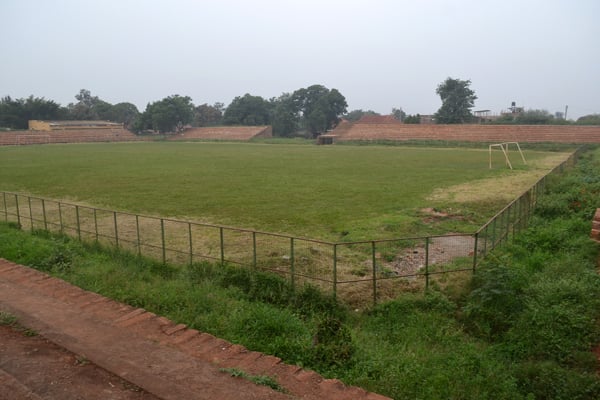Jinja City, Indian community claim Kakindu Stadium land

Kakindu Stadium that Jinja City Authority and Indian Recreation Club, through the Indian Association of Uganda Board of Trustees, are claiming ownership. PHOTO/DENIS EDEMA
What you need to know:
- In 1913, the Indians acquired a 49-year lease for the land which expired in 1962, ten years before they were expelled from Uganda by then President Idi Amin. They, however, claim they renewed the lease that, according to Jinja City Authority, expired in 1993.
Leaders in Jinja Central Division are divided over the giveaway of Kakindu Community Centre to Indian Recreation Club through Indian Association of Uganda Board of Trustees.
The five-acre land, which houses Kakindu Club house, football pitch (Kakindu Stadium), a volleyball court, city administration offices, conference hall, and public library, is on Plot 17-27, Gabula Road, in Jinja City Centre.
Though the Indian Recreation Club went to Court in 2015 claiming ownership of the land, court has fixed tomorrow as the date for the hearing of the case.
Some leaders want the case settled out of court, at least going by the meeting held at Jinja City Council Hall, last Tuesday.
In the meeting, the Jinja City Council Speaker, Mr Moses Morrison Bizitu, said he wants the Indian community to accept an alternative land instead of taking the facility, which is benefiting the community.
“I have held several meetings with the Indian community and proposed to them an offer to accept an alternative land equivalent to Kakindu, but outside the city because you cannot just give away community land that has a stadium, which can generate revenue more than a market,’’ he said.
According to Mr Bizitu, if the Indian community take over Kakindu Community Centre, the public will be limited from accessing it because they will redevelop the facility for themselves, not in public interest.
Mr Abubaker Kirunda, the Jinja Northern Division City clerk, said the land belongs to Jinja City Council as sitting tenants because the lease that was given to Indians expired.
“The land doesn’t belong to the Indian community because by the time Amin expelled them from Uganda, the lease had already expired and the repossession certificate they acquired in 1996 was invalid,’’ he said.
Mr Epaphras Kibugudho, a member of Jinja City Development Forum, comprising local stakeholders meant to bridge the gap between the community and the urban authorities, said the case should be settled out of court by compensating Indians through the Land Fund.
Mr Majid Batambuze, the outgoing Jinja City mayor, said they cannot allow the Indian community to take the community property on grounds of claiming to have a freehold title.
In a November 30, 2020 letter addressed to the Registered Trustees of the Indian Recreation Club, signed by the Jinja City Clerk, Mr Ambrose Ocen, several conditions were put in place if the case is to be settled out of court and Indians repossess the land.
Some of the conditions, according to the letter, are that Jinja City will restrict the freehold lease to the Registered Trustees of the Indian Recreation Club, pay premium and ground rent in accordance with the value determined by the chief government valuer and comply with the standards of the leases.
However, the Indians, through their lawyers of AF Mpanga Advocates, objected to the restriction of the freehold lease, paying of premium and ground rent.
Mr Albert Balodha, the chairperson of the boda boda welfare, urged the leadership of Jinja City to come out and protect people’s interests rather than giving out Kakindu to Indians.




